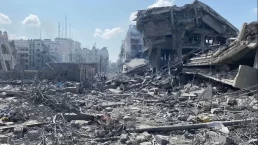The discussion revolves around the moral and political implications of Israel’s actions in Gaza, the historical context of Zionism, and the need for a reevaluation of Jewish identity and solidarity in light of the ongoing conflict.
By RJ Eskow and Peter Beinart, The Zero Hour
In a conversation with Richard Eskow, Peter Beinart discusses his book, Being Jewish After the Destruction of Gaza: A Reckoning, which calls for a moral reevaluation of Jewish identity and solidarity in light of Israel’s actions in Gaza.
The discussion revolves around the moral and political implications of Israel’s actions in Gaza, the historical context of Zionism, and the need for a reevaluation of Jewish identity and solidarity in light of the ongoing conflict. Beinart argues that the destruction of Gaza, carried out with American support and in the name of the Jewish people, demands a moral reckoning. He emphasizes the catastrophic humanitarian impact on Palestinians and the complicity of many Jewish institutions.

Beinart critiques the ethical foundations of Zionism, arguing that Jewish safety and justice depend on equality under the law rather than ethno-nationalist supremacy. He reflects on the historical displacement of Palestinians, the failure of nonviolent resistance due to lack of support, and the emotional challenges of confronting deeply held beliefs about Israel. He challenges the notion that Jewish safety depends on maintaining a Jewish state with legal supremacy. He argues that equality under the law, rather than ethno-nationalism, is the key to long-term safety for both Jews and Palestinians.
While expressing pessimism about the current trajectory, Beinart hopes for a global movement that pressures Israel to recognize Palestinian rights and move toward a future of mutual equality and coexistence. The conversation underscores the need for a profound moral and political reckoning, advocating for a future based on equality and mutual recognition rather than domination and exclusion.
Recent Posts
New Addition to List of Nuclear Near Catastrophes
February 25, 2026
Take Action Now Debris flew for great distances — many times the distance of 270 meters to a nuclear reactor and nuclear storage facility.By David…
Gavin Newsom’s last budget belies his ‘California for All’ pledge
February 24, 2026
Take Action Now Yet, even as the state is poised to lose billions in federal funding, and millions of Californians are losing access to health care…
Israel and American Hawks are Pushing U.S. to Iran War With Catastrophic Consequences
February 23, 2026
Take Action Now At the World Health Assembly in May, member states may endorse an unprecedented strategy declaring that health is not a cost – but…
A Child’s View of the Attack on Venezuela. And a Peace Flotilla
February 23, 2026
Take Action Now Fabricio said that he and his family went out of their building and saw many people also going outside, running around, and kids…




